Abstract
The way that teachers and parents communicate has a huge influence on the development and education of children. Therefore, it is essential that school andfamily have common goals. The quality of the partnership between school and family is influenced by the attitudes, expectations and opinions regarding the role of the school in children’s development. The purpose of this study is to investigate the opinion of the parents towards the communication between school and family, the quality of cooperation and the strategies that we should apply in order to improve the school-family partnership. Our paper focuses only on the parents’ views regarding the best ways to improve the school and family communication and offers us an image of what parents expect from teachers. The instrument used for data collection was a semi-structured questionnaire, which can be found in the Appendix. The questionnaire approached subjects like: most efficient forms of communication with teachers, frequency and efficiency of communication and aslo causes and solution of conflicts that appear between teachers and parents.
Keywords: CommunicationSchool-Family PartnershipRomanian Primary Educational System
1. Introduction
This study has an important role for offering us an overview of the educational realities that influence the quality of the communication between school and family. It is very important to understand parents' opinions regarding the positive relationship that should be established between family and school. We consider that the goal of facilitating collaboration among parents and teachers is not easily obtained. We need commitment and willingness to find new strategies that help us do the things differently and much better, to strengthen the school and family partnership. According to Swick (2003, p. 275), “in relation to parent–teacher and family–school–community partnerships, communication is the critical factor. For example, teachers and parents need to see their communicative relationship in a partnership manner”. Furthermore, “in a vulnerable social economic context, dominated by the growth of poverty phenomenon, by emigration, the extension of social inequalities, increasing unemployment, fear of job loss, distrust in public institution and services, school-families cooperation has become a national priority.” (Margaritoiu & Eftimie, 2011, p. 42).
According to Epstein (2002), teachers should communicate with families about school programs and child progress. Moreover, teachers have the duty to create and maintain two-way communication channels between school and home during their cooperation. There are six types of family involvement, included in the model developed by Epstein: parenting, communicating, volunteering, learning at home, decision-making, and collaborating with the community. “Educational partnership, as a form of communication, cooperation and collaboration in child support in the educational process implies a unit of requirements, options, decisions and educational activities among educational factors” (Gurloiu, 2015, p. 606). We consider that the key to each successful partnership is the efficiency of the communication and the positive relationship between partners.
2. Methodology and results
The data was collected using a semi-structured questionnaire. We conducted the survey on a sample of 38 parents aged 27 to 47 from a rural area from Cluj County. The research question was: What can parents and teachers do in order to communicate more efficiently? The questionnaire contains 15 questions regarding the most efficient form to communicate with the teachers, the frequency of communication and the person that should initiate it, the efficiency of communication, the importance of the relationship between parents and teachers, the cause of conflicts and solutions that could be found in order to improve teacher-parent communication. Participants had answered to closed or opened questions. Concerning the level of education, participants have different levels of education: 44,74% with low education level, 50% with average educational level, and 5.26% with high educational level. Their children are enrolled in the Romanian primary educational system. The questionnaire was completed by 35 mothers (92.11%) and only 3 fathers (7.89%). We are giving below a summary of the answers to the questions that were applied.
The results for “What is the most efficient form of communication between you and the teacher?” showed that most parents prefer telephone conversations (15,79%), parent meetings (18,42%), individual meetings (18.42%) and both parent meetings and telephone conversations (47.37%). (see Fig.
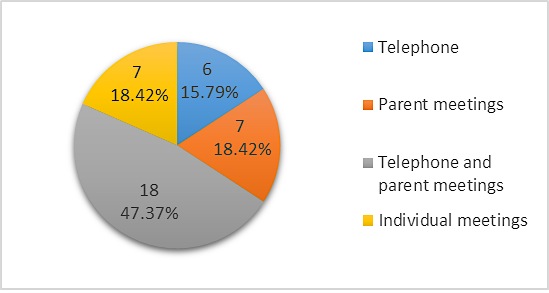
The answers to the question “Who is the person that should initiate the most frequently the communication between teachers and parents?” show that 55.26% considered that teachers should have the initiative while others (44.74%) indicate that parents are responsible for initiating more frequently the dialogue with the teachers. (see Fig.
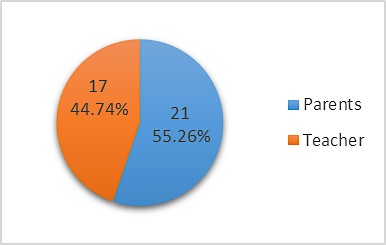
The answers offered question 3 showed that the majority of the participants had communicated with teachers once a week, while the rest had communicated once in a semester or a month. (see Fig.
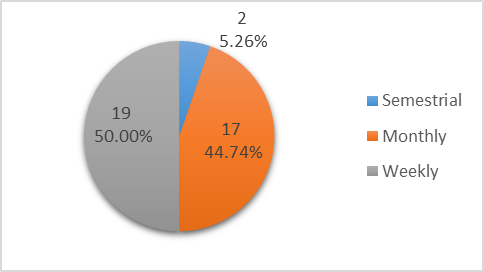
The results for “What are your areas of interest?” are submitted in Fig.
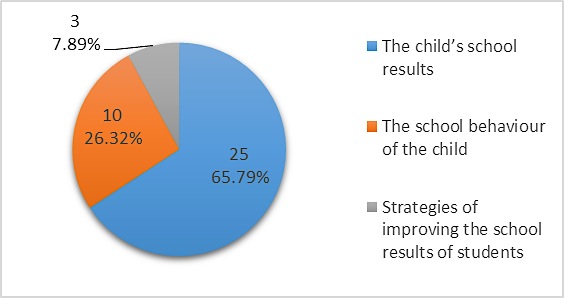
The answers offered to the question 5: “How do you communicate with the teacher?” indicate that all parents consider themselves as being efficient in the way that they communicate with the teacher. At the same time, the answers given to question 6 indicate that parents considered that opinions and suggestions are sometimes taken into account by the teacher (7.89%), often (26.32%) and always (65.79%). (see Fig.
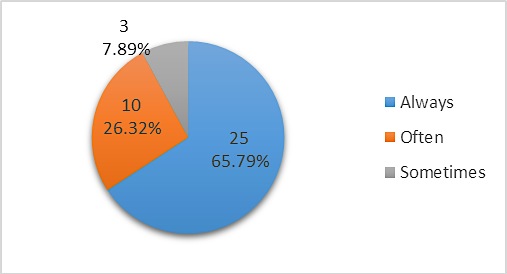
The answers to the seventh question, regarding the children’s school results, reveal that parents appreciate the school results as being: good (47.37%,) and very good (52.63%). It is interesting that the majority of the parents (65.79%) believe that their child will obtain school results similar to the ones obtained currently, others appreciate that the results will be better (31.58%) while one parent (2.63%) appreciates that his child will obtain lower results in the future (question 8).
The answers to questions 9 and 10 indicate the importance of the cooperation between parents and teachers from the perspective of children and parents. All the participants considered important or very important the cooperation with the teacher. (see Fig.
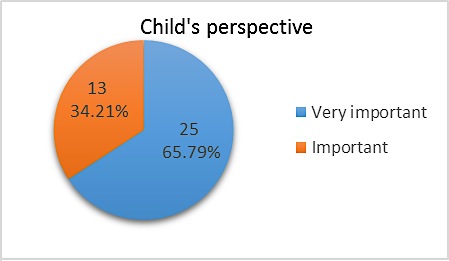
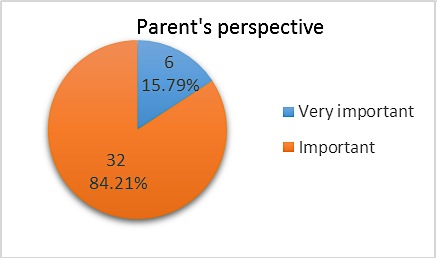
All the participants (100%) consider that teachers have a good attitude towards them (question 11) and cooperate well and very well with the teacher (question 13). The affirmative answers to question 12 “Would you like to find out more about your child’s qualities from his/ her teacher?” reveal that it is beneficial to initiate conversations about the positive qualities of the children.
Parents were asked to list the causes of conflicts that can occur between parents and teachers and the solutions that they suggest in order to optimize their communication and cooperation (question 14 and 15). Table
3. Discussions
The results of the current paper reveal some important answers regarding the way that teachers should initiate discussions with parents in order to optimize their teaching activity.
Analyzing the answers it is evident that parents consider that the teacher has a huge influence on the quality of communication and cooperation. We also found out that parents and children consider important and very important the partnership between school and family. An important aspect revealed by the research is that all parents would like to know more things about the positive qualities of their children and there is an increased interest for a better communication with the teacher. It is necessary to outline that some of the participants are Members of the Parent Committee. Based on their answers, we can conclude that: they prefer parent meetings and weekly contexts of communication, they expect that the teacher initiates more frequently the conversations and feel that their suggestions are often taken into account by the teacher. None of the respondents prefer to be contacted through e-mail or notes. The research findings include educational realities that influence the educational practices regarding school-family partnership.
4. Conclusions
The main goal of the study was to identify effective ways to optimize school-family communication, starting from parents’ attitudes regarding their actual collaboration with the teachers. Common goals by both school and family and positive interactions are necessary and beneficial. We may conclude that teachers should always listen and understand parents’ opinions and needs and take responsible decisions to enhance school-family communication. One of the limits of this study is the fact that only the opinions of the parents were considered. The future studies could take into account teachers' opinions regarding school-family communication and include participants from Romanian urban areas.
References
- Epstein, J. L., Sanders, M. G., Simon, B. S., Salinas, K. C., Jansorn, N. R., & Van Voorhis, F. L. (2002). School, family, and community partnerships: Your handbook for action (2nd ed.). Thousand Oaks, CA: Corwin.
- Gurloiu, I. (2014). Educational partnership in primary education. Procedia Social and Behavioral Sciences, 180, 606–611.
- Margaritoiu, A., & Eftimie, S. (2011). Some issues concerning school-family partnerships. Procedia Social and Behavioral Sciences, 11, 42–46.
- Swick, K. J. (2003). Communication concepts for strengthening Family–School–Community partnerships. Early Childhood Education Journal, 30(4), 275-280.
Copyright information

This work is licensed under a Creative Commons Attribution-NonCommercial-NoDerivatives 4.0 International License.
About this article
Publication Date
22 December 2016
Article Doi
eBook ISBN
978-1-80296-017-4
Publisher
Future Academy
Volume
18
Print ISBN (optional)
-
Edition Number
1st Edition
Pages
1-672
Subjects
Teacher, teacher training, teaching skills, teaching techniques, special education, children with special needs
Cite this article as:
Pancu, C., & Bocos, M. (2016). Strategies for Improving School – Family Cooperation in the Romanian Primary Educational System. In V. Chis, & I. Albulescu (Eds.), Education, Reflection, Development - ERD 2016, vol 18. European Proceedings of Social and Behavioural Sciences (pp. 480-487). Future Academy. https://doi.org/10.15405/epsbs.2016.12.59

